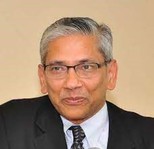报告主题:Techno-economic and Sustainability Evaluation of CCUS Alternatives
报告人:Rafiqul Gani
职称:Professor, Dr, CEO
机构: PSE for SPEED Company Limited (https://www.pseforspeed.com/)
邀 请 人:杨思宇 副研究员(化学与化工学院)
报告时间:2023年4月19日10:30 - 11:30
报告地点:16号楼214会议室
报告形式:线下
化学与化工学院
2023年4月14日
报告人简介:

Rafiqul Gani教授是丹麦技术大学化工与生物工程系的著名教授,是该校“过程计算工程中心”CAPEC的创始人,也是丹麦科学院院士。Gani教授在过程系统工程领域影响巨大,是Computer & Chemical Engineering杂志的前主编(2009-2015),Elsevier CACE (Computer-Aided Chemical Engineering)系列书籍的编辑,同时也是Computers and Chemical Engineering, Sustainable Production & Consumption和 Current Opinion in Chemical Engineering期刊编委会的成员。Rafiqul Gani教授是欧洲化工联合会(European Federation of Chemical Engineering)的前任主席(2017年02月卸任),是“PSE for SPEED”公司的联合创始人和首席执行官,是浙江大学和清华大学的杰出访问教授。Rafiqul Gani教授目前的研究方向包括计算机辅助建模方法工具的开发,物性预测,过程-产品综合与设计,以及过程集成,已发表约500篇学术论文。
报告简介:
Decarbonization is a means to tackle the energy-water-environment-food-health challenge that we face on earth. Starting from carbon dioxide (CO2) capture technologies from dynamic and stationary emissions, to their integration with utilization and/or sequestration technologies, to integrated networks to achieve zero-emission are opportunities worth considering for decarbonization. Techno-economic and sustainability evaluation of well-known technologies, such as direct air capture as well as capture from flue gas streams need to be performed to verify the conditions under which a net zero-emission of CO2 could be achieved through these technologies. However, as capture of CO2 alone will most likely not achieve the objectives of decarbonization, other options such as utilization and sequestration of captured CO2 also need to considered. Both these options, however, have well-known limitations and unlikely to provide alternatives that match sustainable and net-zero emission of CO2 criteria. A promising option, particularly for energy intensive chemical, petrochemical and related processes, is to consider a network of technologies that integrates the base process converting raw materials to desired products with technologies that supply energy, water and other utilities, which the process demands together with technologies to capture CO2 for on-site utilization. A systems approach with a new class of methods and computer-aided tools are needed to tackle this complexity related to the mathematical representation of the problem and its efficient solution. The presentation will highlight a list of known capture technologies ordered in terms of their ability to achieve net-zero or negative emissions. In addition, limitations of utilization and sequestration alternatives will be highlighted, and, sustainable integrated networks that can achieve decarbonization objectives in the short-term and long-term will be presented.
